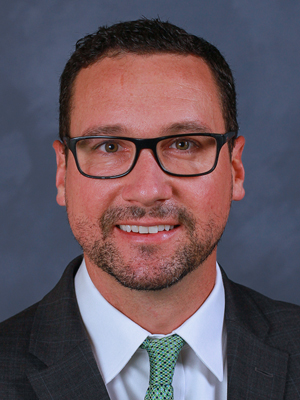
Michael P. O’Leary, MD
What is your name, title, and job position?
Michael P. O’Leary, M.D. Assistant Professor of Surgery, Department of General Surgery, Division of Complex General Surgical Oncology.
In what clinical settings do you work?
I work in the outpatient and inpatient settings.
What makes your job so special?
I am able to meet people at a time when they are extremely vulnerable – with a new diagnosis of cancer. I feel privileged to help the patients better understand their diagnosis and the steps needed to work toward cure. I am also uniquely situated to work alongside incredible team members in surgery, radiology, radiation oncology, medical oncology, pathology and interventional radiology to better help the patients.
What is a typical day and week in your practice?
A typical day involves seeing patients in both in the inpatient and outpatient setting. I specialize in the treatment of stage 4 colorectal cancer and appendiceal neoplasms, along with intraabdominal tumors. I am one of a few surgeons in the world who is able to use heated intraperitoneal chemotherapy to treat patients with disease spread through the abdomen. These cases are typically quite long but the positive outcomes for the patients make it worthwhile.
Most rewarding aspect of your specialty?
The team approach to caring for patients with cancer to achieve cure. I tell many patients that my goal is to see them walk through the doors of my clinic in 5 years and we can hug and celebrate their cure. This is my goal for each patients that I meet. Novel targeted therapies in conjunction with surgery are making this possible for more and more patients.
Most challenging aspect of your specialty?
My specialty involves caring for some patients with stage 4 cancer. With this disease are many challenges which include distress, pain, and financial hardship. This certainly takes a toll on the patient and I really care for these patients like they are my family. And when patients suffer, I hurt alongside them. Fortunately, I have an incredible team of support at Loma Linda that offers multidisciplinary care to address each patient’s need individually.
Any unique challenges faced in your specialty?
Caring for patients with cancer can be daunting and require constant communication with multiple specialties. But again, I am uniquely situated with a wonderful team at Loma Linda who work together to address the challenges.
What is the lifestyle (work-life balance) of a physician in your specialty?
Treating intraabdominal tumors with surgery often requires a lengthy surgery and post-operative stay. As such, I do spend a significant amount of time at the hospital in the operating room or on the wards. However, I am fortunate to have a supportive family and wonderful children who know that I am working to help hurting people.
Did you do any additional fellowship training after and why?
I did a 2-year clinical and basic science research fellowship during residency researching the use of oncolytic viruses to treat an array of cancers. This led to multiple publications with the use of a novel chimeric poxvirus designed in our lab, that is now about to enter clinical trials. After residency, I did a 2-year clinical fellowship in Complex General Surgical Oncology to treat the most common cancers in the world. This training was critical to not only understand the techniques of surgery to remove tumors, but more so to learn the complex coordinated care including chemotherapy, immunotherapy, radiation and timing of surgery.
Why did you choose to work at Loma Linda University Health?
I am so impressed with the comradery and teamwork at LLUH. This team all has the same vision – to work towards curing patients of their cancer. I’m honored to serve alongside my teammates to achieve this goal.
